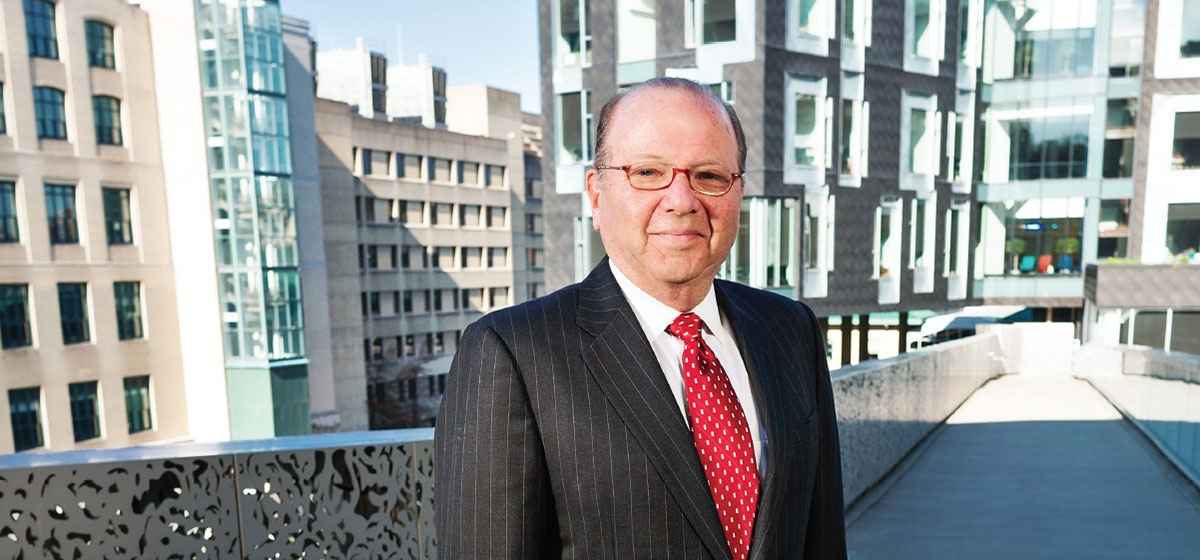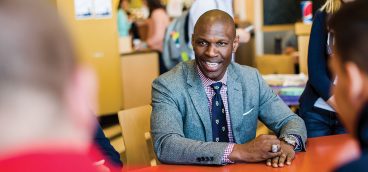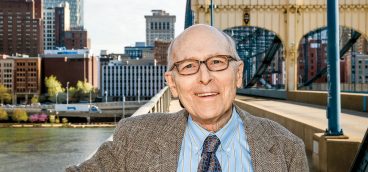Jared L. Cohon, Academician

Editor’s Note: On the occasion of the passing Saturday of Pittsburgh leader and former Carnegie Mellon University President Jared Cohon, we thought you would enjoy reading the story of his life in his own words. Cohon’s tenure at CMU was marked by dramatic expansion of the university’s global footprint and reputation and by a productive partnership and friendship with his Oakland colleague former Pitt Chancellor Mark Nordenberg. His story, from the Summer 2013 issue of PIttsburgh Quarterly, follows.
My grandfather’s name was Kogonovich. He arrived at Ellis Island from Poland in 1918 and didn’t speak a word of English. The immigration agent he encountered somehow believed he had called himself “Cohen,” and apparently didn’t know how to spell that, so he wrote “C-O-H-O-N,” a highly unusual spelling of a very Jewish name. Let’s just say that, when it came to his surname, my grandfather was given a real “Ellis Island special.
I was born and bred in Cleveland, Ohio, and lived there through high school. All four of my grandparents took part in the great Jewish peasant migration from Poland and Russia, and settled in Canton, Ohio. My mother and father moved to Cleveland to attend Western Reserve University, which is now part of Case Western. My mother studied nursing. My father went to law school and became a lawyer, then got into business and real estate. I grew up Jewish in a generation and a household where the history of anti-Semitism and the role of Jews in America was something about which we were very conscious. Nonetheless, as a Jew, I’m barely observant. I was bar-mitzvahed and all of that, and I go to temple on the High Holy Days but, other than that, I don’t participate much. I’m what you’d call a cultural Jew, I guess. But I love being Jewish. I’m proud of it. And I never found that fact to be an obstacle in anything I’ve ever done.
I got my bachelor’s degree in civil engineering at the University of Pennsylvania and my master’s and Ph.D. at M.I.T. I met my wife, Bunny, in second grade, but we didn’t start dating until our senior year in high school. Then I went away to Penn and she stayed home and went to Cleveland State. We got married after our sophomore year—at only age 19, which was a significant risk. But here we are, all these years later. During my last two years at Penn, I got straight A’s—a 4.0—but graduated with something like a 2.9. Guess what I had been doing during my first two years? I was having a whole lot of fun in every place but the classroom. I was a smart kid, but until I got married, a terrible student. I wouldn’t have been accepted at Penn if it weren’t for my SAT scores, which were pretty high, and, I guess, my grades in math and science were good enough. To this day, I think they made a mistake. The admissions staff probably meant to put me in the “reject” pile, but screwed up. When we got married, Bunny quit college, went to work and helped put me through the rest of my schooling. And after we had our daughter, who was born in Boston and became school-aged in Baltimore when I was at Johns Hopkins, Bunny went back to school, finished her bachelor’s and got a law degree, which I admire tremendously. I couldn’t have done that. If I had interrupted my education, I would not have gone back the way she did. So thank God for Bunny. She has had a lasting impact on every aspect of my life. Without her, I have no idea where I’d be today.
After earning my Ph.D., I taught at Johns Hopkins for 19 years, was a dean at Yale for five, and then came here to Carnegie Mellon 16 years ago as president. I’ve been in academia my entire life, except for one year when I took a leave from Hopkins to work as a legislative assistant in energy and environment for the late Daniel Patrick Moynihan, the renowned U.S. senator from New York. So one could say that I’ve never worked in the “real world,” but I feel more than OK about it. I’ve had a fabulous career and wouldn’t change anything. But my area of expertise—about which I taught throughout my career before coming to Carnegie Mellon—is very much a real-world thing. I’m a water source systems specialist and have worked on water-related problems in India, China, and the U.S., all of which proved to be important in the reality of people’s lives.
For the past 16 years at Carnegie Mellon, I have called myself “the accidental president,” or “the Forrest Gump of university administrators,” and there’s a lot of truth to that. At almost every step along the way, when opportunities arose, I simply didn’t say no. I never sought to position myself for any job. After all, life is really about the journey, which often makes a mess of one’s plans. So when students ask me, “What must I do to become this or that?” I set out to destroy whatever ideas they have about life plans, because I don’t believe in them. I tell them to enjoy and focus on whatever it is they’re doing at the moment, and the next step will become apparent.
As a young man, I was minding my own business as a professor at Johns Hopkins, thoroughly enjoying myself. Then one day, I got a call from the dean of engineering asking me to come in to see him. “You’re likely to be promoted to full professor here soon,” he said—which was news to me—”and when you are, I’d like you to be my assistant dean, part-time, because I need help here.” Not one to say no to my boss, I accepted his offer and became, eventually, a full-time associate dean. Later, I got a similar call from the provost and became a full-time vice provost for research.
Then, out of the blue, I got a call from Yale: “Someone gave us your name as a potential dean for our School of Forestry & Environmental Studies.” I wasn’t too interested, but it was Yale, so I went. And the same thing happened for this job. I got a call, again totally out of the blue, from someone I knew who was friends with the faculty member who was leading the search for a new president at Carnegie Mellon. “Would you be interested?” he asked. And I said no, just like that, without even thinking about it, because I was happy doing what I was doing at Yale. But the caller knew me well enough to say, “Don’t say no, Jerry. Go home and talk to your wife about it, and I’ll call you back tomorrow.” So that night, over dinner, I asked Bunny, “How was your day?” “Fine, honey,” she said. “How was yours?” “Oh, so-and-so called and wanted to know if I wanted to be a candidate for president of Carnegie Mellon.” “Well, what did you say, Jerry?” “No,” I told her. “What?!” she exclaimed. “Don’t you want to be president of a top-flight university?” “I guess so,” I said. “Is something wrong with Carnegie Mellon?” she pressed. “No, it’s a great school.” “Well, then, call them back tomorrow and say yes.” So I did, and here I am. That’s how it all happened.
After I was appointed, but before I actually came to Pittsburgh, I met with a highly placed person who knew Carnegie Mellon, even though he’d never spent any time here. He said to me, “Jerry, always remember that Carnegie Mellon and Pittsburgh are both great, but neither believes it,” which was true. A sense of modesty about the institution exists in this town, which is admirable, but it goes too far. If anything, there could be a sense of arrogance at Carnegie Mellon, but I’m glad there isn’t. So part of what I’ve done as president is to be a cheerleader for the university; to tell the staff, faculty and students how great they are and to get them to pause to celebrate it from time to time. I think much of the university’s low-key self-perception is that we are very much of Pittsburgh. We are a Pittsburgh institution, and I think that brings with it that rather self-conscious Pittsburgh gestalt, which can be traced all the way back to our origins. We were created as a trade school and possess a certain sense of modesty that comes from having humble beginnings. We were founded on the idea that we would be involved in making things, and practical problem-solving, not just theoretical mind work. But there’s that old engineer’s creed: “Build a better mousetrap, and the world will beat a path to your door,” which is not about self-importance, but rather about doing the work and, if you’re really good, the world will know it. Unfortunately, that’s not the way things work anymore. Universities must market themselves, and that’s what I’ve tried to do during my tenure.
Not many engineers are presidents at leading universities, and I don’t know why. I never sought to be one. But early in my career as a professor, graduate students would, on occasion, say to me, “You’re going to be a university president someday,” and I would just blow that off. Upon reflection, I believe what they saw in me were the interpersonal skills that I possess. I don’t know where those come from; I just have them. And I’m confident that, if you ask people around here, “What do you like about Jerry Cohon?,” the first thing they’ll say is, “He’s a good listener.” A university president is essentially the CEO of the institution, which invokes the image of one being in command and ordering things to be done by fiat. It may work that way in many corporations, but not in universities, where the president’s authority is somewhat limited. I like people. I enjoy sitting with faculty, students, staff and alumni and hearing about their lives, interests and challenges.
My job is more about articulating a shared vision than it is giving orders. It never works when a president says, “I know where we should go, so follow me.” Experience has taught me that it’s better to do less talking and more listening because, in the process, one develops an idea of where the university is headed naturally. Being president is about representing the university not only to the outside but to itself, too—feeding back to the university community what you’ve heard from its members, which reinforces their sense of what the university is about. That’s important in universities everywhere, but it’s been particularly important here. Carnegie Mellon people have an exceptionally strong understanding of the institution. If you were to stop any number of people at random on campus—faculty, staff, students, and even alumni—and say, “Quick, tell me three things about Carnegie Mellon that you think are distinctive,” I’m confident that you would hear roughly the same things from everyone. They don’t need me to tell them what Carnegie Mellon is about. They already know. But having their vision of the institution reaffirmed by their president is always a good thing.
Being president of a university, especially one as fine as Carnegie Mellon, is a privilege. I’ve loved doing this and could keep doing it and loving it forever but, alas, I decided to step down, and will do so in June. Changes in leadership are important for any organization, but especially at universities, which trade in the currency of new ideas. Luckily for me, academia is the only industry, if you will, where the CEO can go back and be a worker again. It’s now time for me to go back to being a professor, which is where I started, and the jury is out as to whether I’ll be able to do it successfully. We have very high standards here at Carnegie Mellon in everything we do, and I don’t want to be dead weight. I want to contribute. And I’m looking forward to the challenge. I love teaching. I love doing research. And I love Pittsburgh. Bunny and I loved it from the moment we got here, but what sealed the deal was when our daughter moved here to attend grad school at Carnegie Mellon. She got a master’s in arts management and met her husband, who was also a graduate student here, and they chose to make Pittsburgh their home. They have two sons—ages 5 and 9—and live just two miles away from us. That has made Pittsburgh special for Bunny and me. The question of where we would retire was settled the minute my first grandchild was born.
All in all, the current generation of college students—and our entire nation, for that matter—faces huge challenges going forward. Climate change is real. The contention that humans are the major contributor to it is beyond scientific dispute, yet we’re doing almost nothing about it, and seem incapable of coming to grips with it either as a nation or as a world. What the path is toward meaningful and practical engagement on the issue is not at all clear to me. I just don’t know how we will get there. Perhaps we need a carbon tax or something similar to that, but just saying those words in Washington, D.C., could get you shot these days. In addition, one of the great changes that our nation and our world are experiencing is the sure and steady rise of Asia. China is in the lead right now, but India and a host of other countries—Indonesia, Malaysia and Vietnam—are also on the move. There will come a time in this century when China surpasses America as the world’s leading economic power, which isn’t a bad thing, necessarily. But we were born and bred in the American Century, during which we became, without question, the dominant power in the world in every way—economically, militarily, culturally—and we’re used to thinking of it as our world. How are we, as Americans, going to deal with a new world where we are not No. 1; where we are sharing the world’s stage with at least one other great power? And how will China handle this, for that matter?
Change is coming and I’m interested in seeing how things play out. I have two grandsons coming up, but I also have a university family to think about. We took a big bet during my time at Carnegie Mellon when we became one of the most aggressive American universities in the push to become international. We now have campuses in Silicon Valley, Qatar in the Middle East, Rwanda and Australia. We have a major program in Portugal and are starting another this year in China, and a smaller one, which we hope will become bigger, in India. People ask me, “Why are you doing this?” My answer is to tell them a hypothetical, made-up anecdote, which goes like this: Imagine you’re overhearing a conversation in 1880 between the vice chancellors of Cambridge and Oxford, and one is saying to the other: “Did you hear about Harvard? The people there actually think that someday they’re going to be equal to us.” “Preposterous,” says the other chancellor. “It’s just another upstart American institution. We have the best universities in the world—always have and always will.” Of course, we all know what happened. Harvard not only caught up with Cambridge and Oxford, but raced past them. That’s going to happen again, and I’m willing to bet that American universities that have really meaningful physical presences and are thought to be part of the economies of major countries like China and India will be in an advantageous position. That’s why we’re doing what we’re doing. It makes sense, and it’s the only way we’ll be able to stay competitive on an increasingly global playing field.






